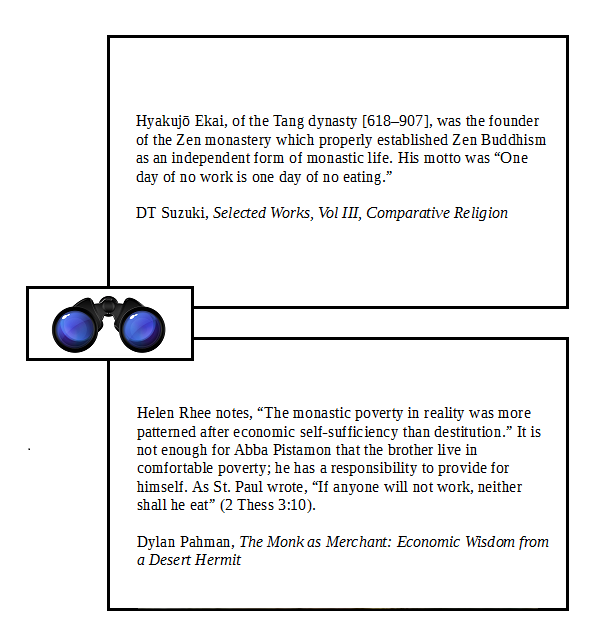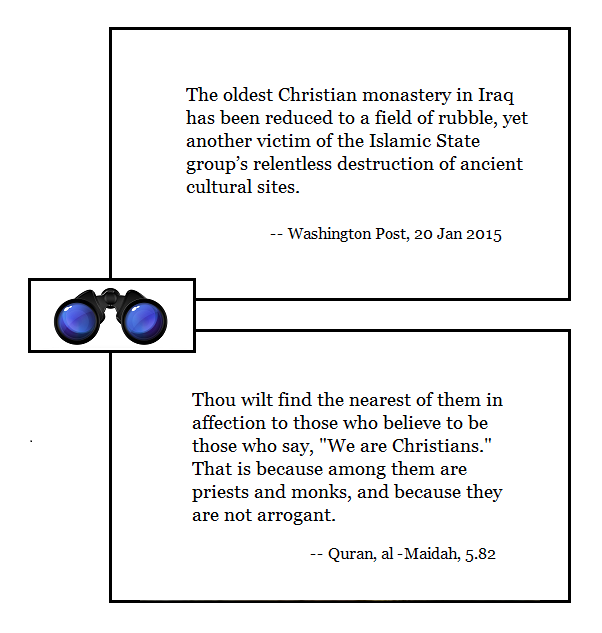[ by Charles Cameron — of martyrdom according to ISIS and the church, & of forgiveness in response to hate — continuing from Of sacrifice and martyrdom ]
.
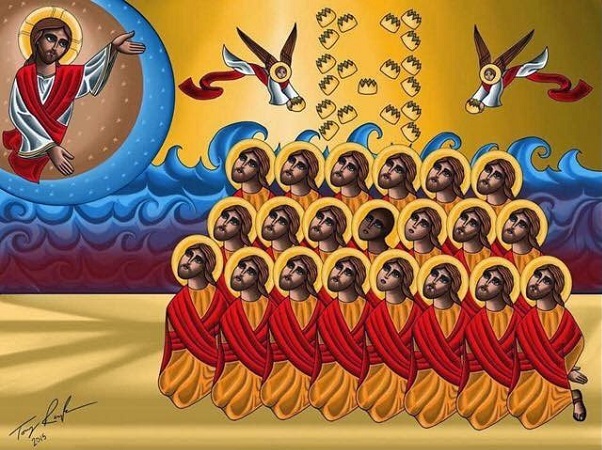
Icon by Coptic artist Tony Rezk. The martyrs’ faces are the faces of Christ.
**
My Lapido piece closed with these words:
That is, in part, why Pope Francis in his official comment on the event said he was “particularly troubled to learn that this act of violence took place in a church, during Mass, a liturgical act that implores of God His peace on earth.”
The Pope went on to say he “asks the Lord to inspire in all thoughts of reconciliation and fraternity in this new trial, and to extend to everyone the abundance of His blessings”. And that, perhaps, is the hardest thing for us – and for France – to understand.
The natural reaction to such a barbarous act as the killing of a defenceless 86-year old priest is horrified anger, and French President François Hollande, true to France’s claim to be secular, described the killing as a “desecration of French democracy” – and declared “France is at war.”
**
Democracy was far from the only thing that was desecrated. The image of God in the person of Fr Hamel was desecrated, his priesthood, speaking the words and making the gestures Christ himself had made at the Last Supper was desecrated, the sacred place in which he stood and woshipped was desecrated, and the sacrament of the Mass was desecrated .
And to all this, The Pope responded with words of forgivesness, asking God “to inspire in all thoughts of reconciliation and fraternity”.
**
Martha Nussbaum:
The American philosopher Martha Nussbaum has recently written an essay titled Beyond Anger, in which she begins to explain the futility of vengeance, citing Nelson Mandela as someone who went beyond anger to achieve great things:
He often said that he knew anger well, and that he had to struggle against the demand for payback in his own personality. He reported that during his 27 years of imprisonment he had to practice a disciplined type of meditation to keep his personality moving forward and avoiding the anger trap.
Nussbaum is presenting in psychological, philosophical and political terms the outlook which for Pope Francis is embodied in the words of Christ: “Love your enemies, bless them that curse you, do good to them that hate you, and pray for them which despitefully use you, and persecute you; that ye may be children of your Father which is in heaven.”
This attitude runs strikingly against the grain of secular thinking in our age.
With the tragic death of Fr Jacques Hamel and the words of Pope Francis, we are reminded once again that there exists another possibility than retribution, a way of forgiveness and peace in place of redoubled fury and war.
**
Tibhirine:
We hve seen this forgivesness before. To grasp how different Pope Francis’ message is from the vegneance which seems like second nature to us, we may want to recall the French Trappist monks of Tibhirine in Algeria, killed by Islamist terrorists in 1996, and to read again the remarkable words of Christian de Chergé in his Last Testament:
If it should happen one day – and it could be today – that I become a victim of the terrorism which now seems ready to encompass all the foreigners living in Algeria, I would like my community, my Church, my family, to remember that my life was given to God and to this country. I ask them to accept that the One Master of all life was not a stranger to this brutal departure.
Addressing his future attacker, de Chergé says:
And you also, the friend of my final moment, who would not be aware of what you were doing. Yes, for you also I wish this “thank you” – and this adieu – to commend you to the God whose face I see in yours.
**
Copts:
We witnessed it among the Coptic Christians when so many of their sons were brutally beheaded by ISIS.
As I noted at the time in Some recent words from the Forgiveness Chronicles, Angaelos, General Bishop of the Coptic Orthodox Church in the United Kingdom, said when he was interviewed shortly after the event:
Q: Not long after the video released, you tweeted about the killings, using the hashtag #FatherForgive. Did you mean that you forgive ISIS?
A:Yes. It may seem unbelievable to some of your readers, but as a Christian and a Christian minister I have a responsibility to myself and to others to guide them down this path of forgiveness. We don’t forgive the act because the act is heinous. But we do forgive the killers from the depths of our hearts. Otherwise, we would become consumed by anger and hatred. It becomes a spiral of violence that has no place in this world.
**
For Christians, it is clear that Fr Hamel was killed for his faith, and died a martyr. For the followers of ISIS, the same kind of claim will be made — that the two jihadist “soldiers” died at the hands of the French police while fighting jihad fi sabilillah — in the cause of God. But for the Muslim community of France as a whole, the killing of Fr Hamel was an act of brutality without religious sanction — indeed, quite the opposite:
Community leaders in Saint-Etienne-du-Rouvray, Normandy said they did not want to “taint” Islam by having any association with Adel Kermiche, the 19-year-old jihadist who killed Father Jacques Hamel in his hometown in northern France.
Mohammed Karabila, president of the local Muslim cultural association and imam of one of the town’s mosques, told Le Parisien newspaper: “We’re not going to taint Islam with this person. We won’t participate in preparing the body or the burial.”
Considering the importance of quick burial in Muslim theology, that is a pretty clear indication of the distance the Muslims of St Étienne-du-Rouvray wish to put between their faith and its distorted image in the mind of ISIS.
Not only didnthe local Muslims refuse to accept Kermiche’s body for burial, an appeal went out for Muslims to attend Mass on today, Sunday, in grief and solidarity with the Catholics and with the people of France. As Hend Amry put it:
Catholic priests were invited to attend, and spoke at Saint-Etienne-du-Rouvray mosque, which had been built on land donated by the church — and across France, in tears, countless Muslims attended Mass, in St Étienne-du-Rouvray, in Rouen Cathedral, and as far away as Italy and Corsica.
**
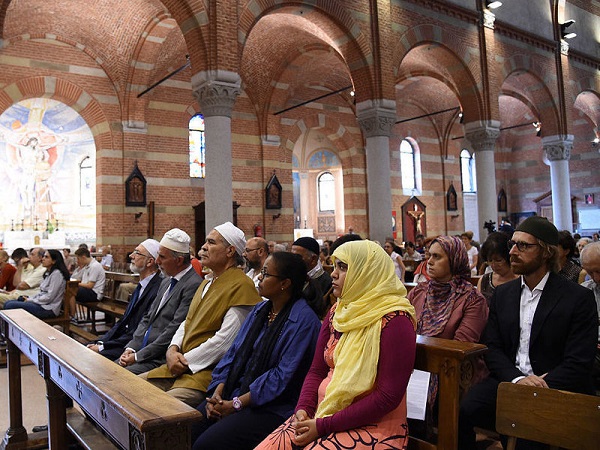
Muslims at Mass in Milan, Italy

Catholic-Muslim friendship in wake of killing of Fr Hamel, AFP.
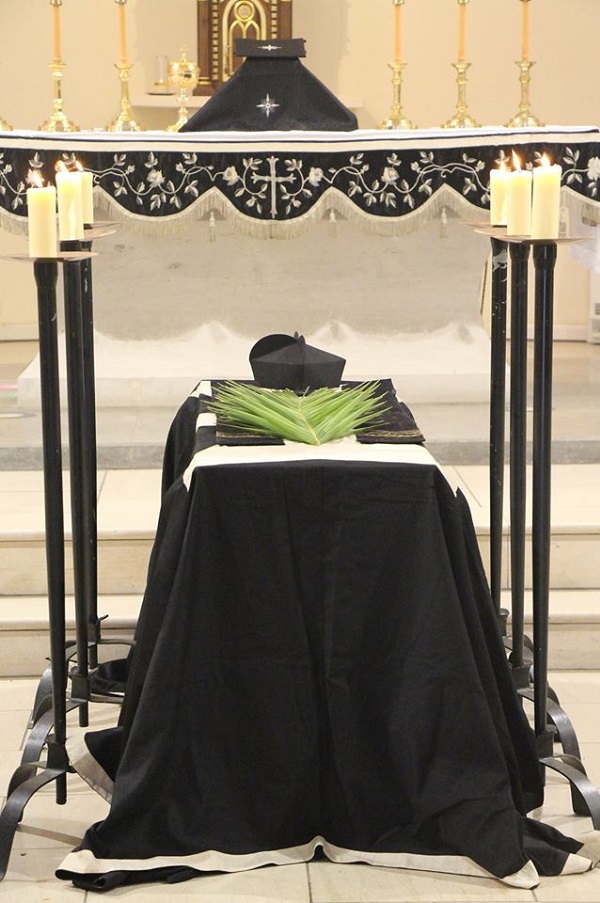
Catafalque, Requiem Mass for Fr Hamel, Faternity of St Joseph the Guardian, La-Londe-Les-Maures.
